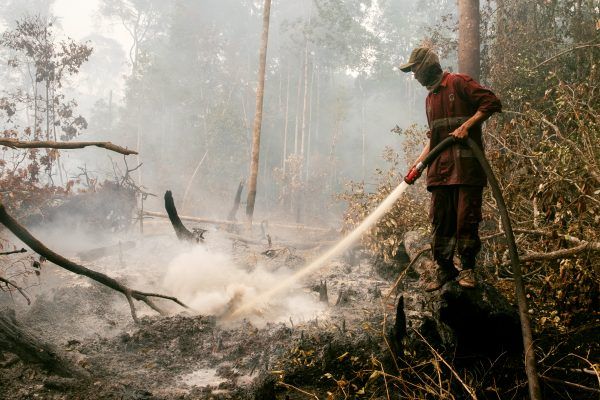Defund Indonesia's Deadly Peat Fires

In a South Sumatran courtroom, a dozen ordinary people have begun a challenge to a seemingly intractable problem that blights not just their own province, but neighboring countries and ultimately the planet: that of smoke haze and greenhouse gas emissions from Indonesia’s recurring peatland fires. They are suing several pulpwood companies, arguing that their practice of clearing and draining peatlands has led to recurring out-of-control fires. They claim these plantation commodity companies are financially liable for the damaging smoke’s impact, arguing that under the doctrine of market share liability, each should be accountable for its share of the damage caused.
As Indonesia’s delayed dry season now ramps up, their brave efforts ought to inspire policy action elsewhere, because the haze is a problem that is being driven by irresponsible financing from around the world.
Indonesia’s tropical peatland is a biodiversity wonder. Home to orangutans, tigers, and elephants, this vibrant rainforest ecosystem also serves as a planetary carbon sink, storing an estimated 57 gigatons of carbon, more than five years’ worth of global emissions.
While this carbon storehouse took thousands of years to accumulate, it has taken just a couple of decades for the giants of the plantation industry to convert it from a green haven to scorched hellscape by clearing and draining the peat forest, replacing it with industrial monocultures producing palm oil, pulp, and paper. In draining away the water that is the peatland’s lifeblood, companies turn the previously fireproof landscape into a tinderbox where just a spark leads to wildfires that can take weeks to extinguish during Indonesia’s dry season.
This is a crisis of vast proportions – Greenpeace Indonesia identified a total burned area of 600,000 hectares of peatland last year. Indonesia’s fire toll during the severely dry years of 2015 and 2019 was even worse, at times emitting more carbon in a day than the entire U.S. economy did, according to the World Resources Institute. The dense haze emitted from these peatland fires contains smoke particles microscopic enough to travel from the lungs into the bloodstream, causing stroke, heart disease, lung cancer, and asthma. A 2022 university study calculated that pollution from peatland fires in Sumatra and Kalimantan during the five years from 2013 caused annual premature deaths of about 33,100 adults and 2,900 infants along with thousands of hospital admissions and severe asthma cases in children.
In tracing the finances that flow to Indonesia’s fire-plagued plantation giants, one name that frequently surfaces is the Sinar Mas Group. Connected to many pulpwood plantations with the largest burned areas in Indonesia, the total burned area across all Sinar Mas linked pulp concessions was 314,200 hectares during 2015–2019.
Independent analyst Profundo, a research organization specializing in financial and corporate analysis, traced the funds received by Sinar Mas’s numerous companies from 2015 to 2023. In total, according to Profundo’s findings, the group’s companies obtained approximately $40 billion in credit deals from global financial institutions, with major creditors from Indonesia, China, Malaysia, Japan, the United Kingdom, and Singapore. In terms of shareholdings, investors from the United States have put $504 million into Sinar Mas Group since 2022, alongside investors from the United Kingdom, Norway, and the EU with shareholdings worth $407 million.
These massive financial flows have directly fueled the vast scale of peatland conversion and resulting fires.
Greenpeace Indonesia’s latest report found that last year, 26,411 hectares burned inside the concession of a long-term Sinar Mas supplier, PT Bumi Mekar Hijau (BMH), whose pulpwood plantation is largely peatland, according to public maps. BMH has a grim record of repeated fires: In 2014, 20,000 hectares of the company’s concession area burned, leading to a court order to pay $5 million. Further fires followed in 2015 and again in 2019, when according to Greenpeace Indonesia’s estimate, no less than 24,000 hectares were engulfed in flames.
Similarly, other Sinar Mas suppliers experienced fires in 2023, such as PT Sebangun Bumi Andalas, in which an area of 6,745 hectares burned, and PT Bumi Andalas Permai, where 2,179 hectares burned. These three Sinar Mas suppliers, all based in South Sumatra, are named in the citizens’ newly lodged lawsuit.
International financiers are also complicit in this peatland destruction and the fires, carbon emissions, and deadly smoke pollution that ensues. Governments worldwide, including Indonesia, Malaysia, and Singapore where the haze is most keenly felt, have committed to reform the finance sector as part of their efforts to protect biodiversity under the Kunming-Montreal Global Biodiversity Framework of 2022. However as the recurring peatland fires illustrate, there is little evidence of governments reigning in international financing to behemoths like Sinar Mas that continue to destroy nature. Governments need to put green over greed, people over profit, and take bold steps to implement their Kunming-Montreal commitments now.









































